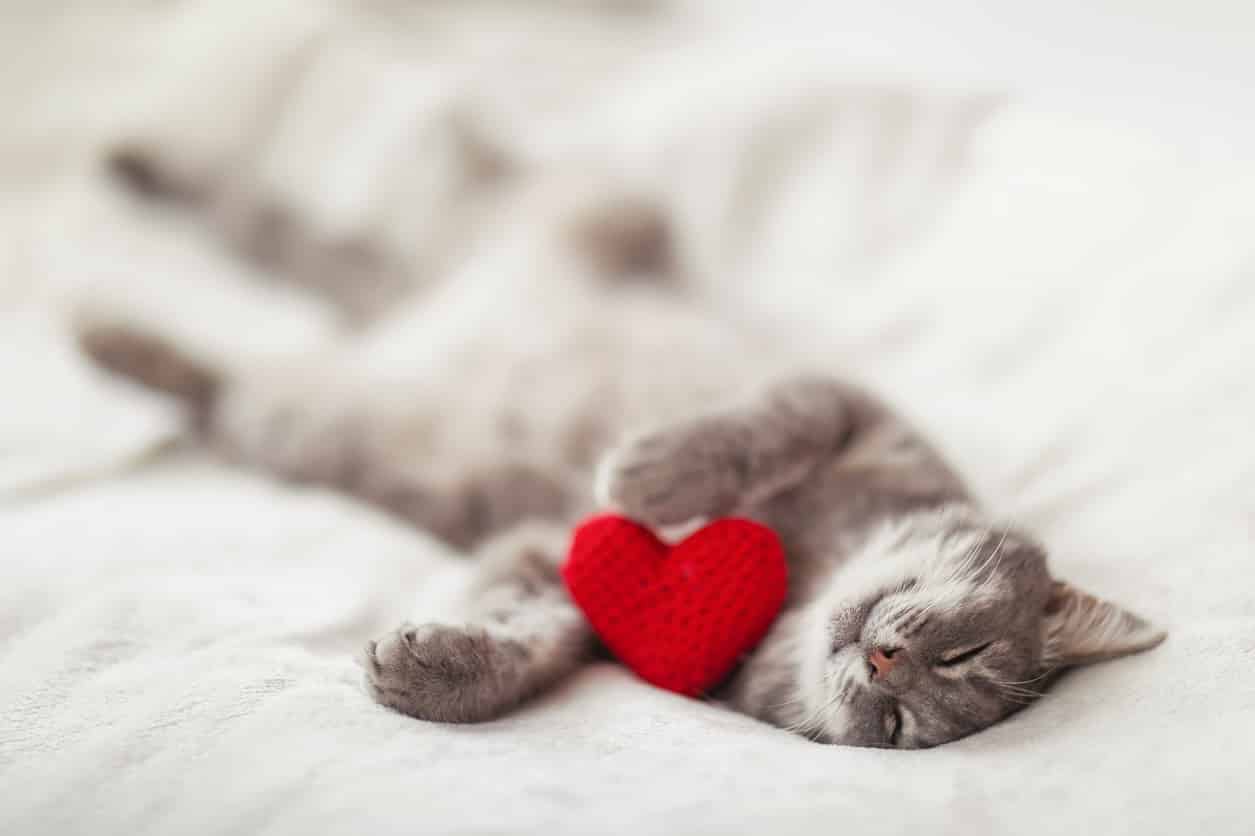Heart Health for Cats

Cats bring unique companionship to our lives that others may never understand. And as a bonus, studies show cat owners are less likely to suffer heart attack and cardiovascular disease than those who lack feline company. But what do we know about the heart health of our cats? One in six cats are born with or develop heart disease in their lifetime. Fortunately, there are things we can do for our feline friends to prevent them developing heart problems.
Heart Disease in Cats
Cats that are born with congenital heart disease can often be helped with medication. Early detection and vigilant treatment are vital to give your cat the best shot at living a relatively full and normal life.
Other cats develop heart disease over time. Again, early detection can save your cat from the distress of suffering unnecessarily. Undetected heart disease left too long will likely result in sudden respiratory distress – something none of us want for our cats. The most common heart disease in cats is hypertrophic cardiomyopathy (HCM).
Vet Checks
Have you noticed your veterinarian whip out the stethoscope at every visit? They are checking your cat’s heart and lungs. Vet visits don’t come cheap, but it is worth popping in for a vet check, annually ideally. The cost of a routine vet check varies, but can cost as little as $50 – a bargain for picking up an abnormality in their cardiovascular system at an early stage. This is even more important as cats age.
Sometimes heart disease symptoms can be a side affect of another treatable condition. Once that primary condition is treated, the heart disease symptoms might disappear altogether.
Cats generally dislike the whole process of visiting the vet from the moment they are in their carrier. But be resolute; it is for their own good.
Stress
Cats are equipped with excellent defence mechanisms, such as their ability to pick up on the slightest movement. Some cats are by nature highly strung. All cats should be protected from unnecessary stress, which overstimulates the nervous system, and the heart. This is no more important than for cats with heart health issues.
General cat care alongside proper nutrition includes providing a safe and quiet space for every cat; somewhere they can retreat to when they feel anxious or overwhelmed and need to take a break from stressors we may not even be aware of.
Lots of attention and cuddles, at at time that suits them of course, not only gives them reassurance and security, but it’s good for your heart health, too. It’s a definite win-win.
Exercise and Activity
Yes, regular exercise is important in a cat’s life. Outdoor cats will generally get enough activity outdoors hunting mice, climbing trees and fences, and running from the dog next door. But with the increasing trend towards keeping cats indoors, exercise my be overlooked especially with cats that aren’t naturally active or inclined to independent play.
Cat behaviourists often stress the importance of playtime for our cats. It not only stimulates their natural hunting instincts, but it is good for their heart as well. Try to take the time daily to play with your cat, especially if they are less inclined to find their own form of activity. Providing toys is a great way to help them exercise on their own.
Diet
It should come as no surprise that a cat’s diet plays a large role in protecting them against heart disease. There are vital nutrients that cats need in their diet, and additives to avoid that are harmful to their health. Essential nutrients include taurine and amino acids. Harmful additives to look out for include sodium and carbohydrates.
Amino Acids
Amino acids provide cats with the building blocks needed for vital proteins and carbon chains to regulate energy. Quality animal protein contains all 10 essential amino acids that cats’ bodies need but cannot produce.
Deficiencies of a single essential amino acid can cause serious health problems for cats. Take arginine; without enough arginine in a cat’s diet, ammonia is not properly eliminated and spills over into the bloodstream.
Another vital amino acid is taurine.
Taurine
Cats’ bodies don’t manufacture taurine like ours do. Scientists have found that cats lack enough of the vital enzyme required for the production of taurine. A lack of taurine impacts cat health in a number of ways. Taurine deficiency causes irreversible loss of vision and hearing, poor growth in kittens, metabolic and digestion issues, and poor immunity.
Deficiency of this essential amino acid also leads to heart disease. Taurine keeps the function of the heart in check. Without it, cats develop congestive heart failure. Taurine is found almost exclusively in animal-based sources of protein, and is largely absent in plant foods.
Grass-Fed Beef and Lamb vs Grain-Fed
It makes sense that what sheep and cows eat significantly affects the nutrients within their meat. Grass-fed lamb and beef contain higher amounts of essential fatty acids.
Scientists compared grass-fed and grain-fed lamb and beef. Unsurprisingly, the results prove they are what they eat.
Grass-fed lamb contains 8% more protein than grain-fed lamb. Grass-fed lamb is also a good source of B vitamins, zinc, iron and high levels of heart-healthy conjugated linoleic acid (CLA) and omega-3 fatty acids, shown to prevent and help fight cancer in animals.
Grass-fed beef contains up to five times as much omega 3 and twice as much CLA as grain-fed beef. For healthy cats, grass-fed animal protein is their best shot at a healthy heart and a healthy life.
Low Sodium
We aren’t the only species that needs to watch sodium levels. In cats, high sodium levels can lead to dehydration, high blood pressure, kidney disease and it can affect the heart.
Cats’ bodies were designed to obtain hydration through their caught prey. They are not naturally water drinkers like dogs, but they will drink if thirsty, so it’s important to provide multiple bowls of fresh, clean water around the home.
All cats should be on a sodium-restricted diet, but this is especially true for cats with heart health issues in order to keep blood pressure stable.
Carbohydrates
A cat’s digestive system is not designed to process carbohydrates. Grains can trigger allergies in cats and lead to internal damage and conditions like IBS. Amino acid deficiency can lead to HCM, so try giving your feline friend a human-grade, meat-based, low-sodium diet that skips the unnecessary grains and fillers.
The Final Word
One in six cats are born with or develop heart disease. There are things we can do to protect the heart heath of our cats. The right cat food, regular vet checks, reducing stress and encouraging activity and play will together give your cat the best shot at optimal heart health for a long and high quality life.

